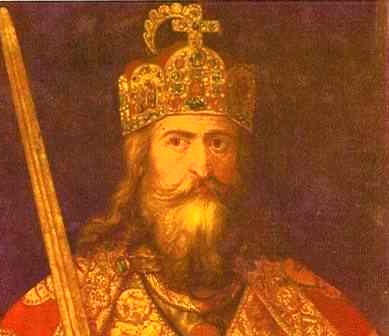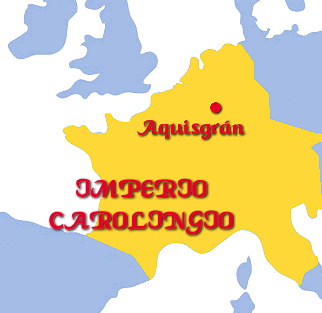Of this Christian king it is said he was a kind ruler and ferociously protective of his family and the Empire. He was generally admired.
His deeds generated all kinds of stories, including romantic ones. However of them are rooted in history, even if some of the details are a little fantastic, and his life has inspired many writers.
Son of King Pepin the Short and a Frankish queen called Bertrada of Laon, whose nickname was Queen Goosefoot. Charlemagne had Germanic blood and spoke that language as well. He was the perfect example of the traits people appreciated most in men: he was very strong, possessed courage and pride.
Charlemagne rose to power in 768 after his father died, co-ruling with his brother Carloman II. The brothers didn't get along and perhaps a war would have ensued, however Carloman died suddenly in 771. That's how Charlemagne, aged 29, became the sole ruler of the Frankish empire.
He then conquered much of Western Europe, under his rule the Carolingian empire became one of the greatest the world has seen. history.

Charlemagne shared his father's opinion of the papacy and became its protector in 772 when Pope Adrian I looked to the king for help. He successfully removed the Lombards from power in Italy and took control for himself.
He then returned to Aachen and undertook fifty-three campaigns, most of them lead by himself or his sons, with the aim of conquering, bringing Christianity to them and at the same time destroying the Avars. His objective was also to protect Italy from raids of the Saracens and shield Francia from attacks of the Moors in Spain who were looking for opportunities to expand their own empire.
The Saxons on the Eastern borders of his empire were not about to embrace Christianity, they burned a church and occasionally incurred into Gaul. For Charlemagne it was reason enough to fall upon them, no less than 18 times between 772 and 804. These was produced many losses on both sides, as Charlemagne and his enemies fought fiercely.
When the Frankish emperor finally conquered the saxons he gave them a choice: convert or die. Many of them acquiesced, but some 4500 rebels refused. They were all beheaded in one single day. After this bloody feat, he then went to Thionville and the nativity of Christ was celebrated.
In 777 the Muslim governor of Barcelona requested Charlemagne's help to fight off the caliph of Cordova, so the Christian King led a campaign against Moorish Spain, besieging and capturing Pamplona, a Christian city (whose inhabitants were actually Christian and were still treated quite badly by Charlemagne) and going as far as Saragossa. However he was promised reinforcement and those never came. At the time he heard of a Saxon rebellion, so the king decided to retreat and fight of his enemies at home.
When he was leaving Iberia one of the most renown events of his long reign took place. As his armies were advancing through the pass of Roncesvalles, the Basque completely destroyed his his rearguard and baggage train. The Battle of Roncevaux Pas ensued. Seneschal Eggihard, the count of the palace Anselm was counted among the dead and also the warden of the Breton March, Roland which inspired the Song of Roland (La Chanson de Roland).
In 788, Charlemagne's attention fixed Bavaria. Some false accusations were made against the Bavarian ruler and in the end his territory was divided into Frankish counties.
For the next ten years, he went on to claim most of Western Europe and flatten anyone who was in the way.

In 799, Pope Leo III fled Rome and turned to Charlemagne. The Romans had not treated the Pope well, in fact they had tried to take out his eyes and tear out his tongue. The head of the Christian church asked the Christian emperor to intervene. Leo wanted Charlemagne restore him. The king agreed and placed the pope under his protection and was crowned Emperor of the Romans in thanks.
Needless to say Empress Irene who was sitting on the throne in Constantinople wasn't best pleased and this led to war between the two empires from 804 - 810. It ended in 812 with emperor Michael I Rhangabes recognizing Charlemagne's status as emperor, although not necessarily as "Emperor of the Romans".
In 813 Louis the Pious, king of Aquitaine, Charlemange's only surviving, legitimate son, was crowned by his own father as co-emperor. He then went back to Aquitaine at his father's orders.
The great emperor died on 28th January 814, when he was 72 years old. Charlemagne had reigned for 47 years.
Charlemagne was succeeded by his son Louis, but the empire lasted only one generation after him before its division. When Louis died his sons divided the empire, according to custom, laying the foundation for two modern European nations: Germany and France.
Charlemagne is view today as the founding father of the French and Germanic monarchies, and as Father or Europe (Pater Europae) as his empire united Western Europe almost entirely, a feat no one had accomplished since the Romans, and the Carolingian dynasty encouraged the unification of an identity shared by European nations.